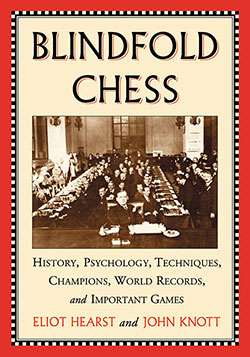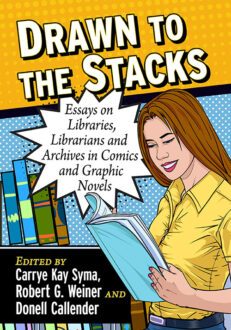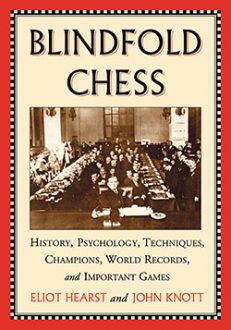Blindfold Chess
History, Psychology, Techniques, Champions, World Records, and Important Games
$49.95
In stock
About the Book
For centuries, blindfold chess—the art of playing without sight of the board or pieces—has produced some of the greatest feats of human memory, progressing to the extent that the world record in 2009 was 45 [and is now 46] simultaneous blindfold games. This work describes the personalities and achievements of some of blindfold chess’s greatest players—including Philidor, Morphy, Blackburne, Zukertort, Pillsbury, Reti, Alekhine, Koltanowski, Najdorf and Fine, as well as present-day grandmasters such as Anand and Kramnik. Including some never before published, 444 games scores are presented, peppered with diagrams and annotations. Hints for playing blindfold, and its practical value, are also included.
About the Author(s)
Bibliographic Details
Eliot Hearst and John Knott
Format: softcover (7 x 10)
Pages: 445
Bibliographic Info: 444 games, 62 photos, diagrams, appendices, bibliography, indexes
Copyright Date: 2013 [2009]
pISBN: 978-0-7864-7526-1
eISBN: 978-0-7864-5292-7
Imprint: McFarland
Table of Contents
Preface and Acknowledgments 1
Introduction 7
PART I. THE HISTORY OF BLINDFOLD CHESS
1. Even Before Philidor 15
2. François-André Philidor 21
3. Between Philidor and the Late 1800s 25
Early Post-Philidor Blindfold Players 25; Louis Paulsen 29; Paul Morphy 34; Joseph Henry Blackburne 39; Johannes Zukertort 43; Other Late 1800s Blindfold Players 47
4. The First Part of the Twentieth Century 50
Introduction 50; Harry Pillsbury 54; Vladimir Ostrogsky 59; Richard Réti (with a bow to Boris KostiW) 62; Gyula Breyer 72; Alexander Alekhine 73; George Koltanowski 83; Miguel Najdorf 91; János Flesch 99; Reuben Fine 110
5. The Last Fifty Years 115
Introduction 115; Francisco J. Pérez, Kenneth Rogoff, Leo
Williams, Vlastimil Hort, Anthony Miles, Jacob Øst Hansen,
Hans Jung, Ole Boegh Larsen, and Garry Kasparov 116–127;
Other Players of Note (Val Zemitis, Ortvin Sarapu, Larry
Christiansen, Sergio Mariotti, Dimitrije Bjelica, Jacques
Mieses, Frank J. Marshall, Samuel Reshevsky et al.) 127–135
6. Women and Blindfold Chess 136
7. Major Recent Tournaments and Matches 139
Introduction 139; The Amber Tournaments 141;
The Future 146
PART II. THE PSYCHOLOGY OF BLINDFOLD CHESS
8. Research on General Chess Skill 151
Cleveland (large units of thought and “position sense”) 151; Djakow, Petrowski, and Rudik (masters’ memories superior only in chess?) 152; Baumgarten (chess prodigy Reshevsky) 153; De Groot (recognition of patterns) 154; Simon et al. (“chunks” in shortand long-term memory) 155; Some Problems with the Simon Group’s Approach 158; Alternatives to the Simon Group’s Approach 162; Imagery, Verbal Knowledge, “Cartoons” 166
9. Psychological Studies and Commentaries on Blindfold Chess 179
Binet 179; Bergson 184; Fine 185; Ericsson et al. 186; Saariluoma 187; Chabris and Hearst 189
10. The Techniques of Blindfold Champions 191
11. The Supposed Health Hazards 200
PART III. BLINDFOLD CHESS GAMES
World Record–Setting Simultaneous Exhibitions 207
Other Significant Games 313
Afterword 391
Appendix A. “World Record” Blindfold Simultaneous Exhibitions Since 1782 395
Appendix B. Proposed Rules for Serious Simultaneous Blindfold Displays 407
Bibliography 409
Games Index (to game numbers) 415
Traditional Openings Index (to game numbers) 422
ECO Openings Index (to game numbers) 424
Illustrations Index (to page numbers) 426
General Index (to page numbers) 427
Book Reviews & Awards
- Book of the Year—United States Chess Federation.
- Finalist, Book of the Year—English Chess Federation
- “The authors are to be highly commended for their research…most comprehensive”—The Compulsive Reader
- “Undoubtedly the most comprehensive book ever written on the subject”—Manchester Chess Federation
- “This is not your typical chess book…an interesting and complex history…it’s not often that a chess book comes along that doesn’t more or less cover the same ground as countless books before it, but this is such a book. The authors combine intellectual curiosity, scientific investigation, and a love of chess to produce what truly can be called the magnum opus of blindfold chess”—ChessCafe.com
- “The authors must be highly commended for their labour of love…and is clearly the ‘go to’ book on the subject…we are dealing with no ordinary book. This is a classic McFarland book, a deeply researched, lovingly produced and definitive enquiry into an area of chess with a view to being the last word on the subject. The book goes into every area of blindfold chess, its history, the philosophy and mind techniques involved, the statistics and 444 annotated games.”—British Chess Magazine
- “Meticulously documented…provides the first extensive coverage of blindfold chess from its earliest known instances through the present day. A truly magnificent and beautiful book!”—New In Chess
- “The authors have achieved what is surely destined to be the definitive work on this subject”—English Chess Federation
- “a superb piece of work…written with enthusiasm…definitive…a landmark book”—Kingpin Chess Magazine
- “What a wonderful book!…one of the best chess books I’ve ever seen, and it justifiably won the Cramer Award for best chess book in 2009. In my view, this is something that should be in every player’s library…easy to read, compelling and fun, it’s so rich in fascinating information that it literally blows one’s mind. Both Eliot Hearst and John Knott deserve my deepest congratulations for this magnificent achievement.”—IM Jeremy Silman, (JeremySilman.com)
- “A book of this importance to its subject is rare in any discipline…thorough, thoughtful, and scholarly—and, at the same time, very enjoyable to read…this volume will be the standard reference work on blindfold chess for a very, very long time…since I believe that true excellence must be rewarded, I hope plenty of readers will…get the definitive work on blindfold chess—along with some wonderful chess reading”—Chess Life
- “Most comprehensive and unique”—The Washington Post
- “In chess the most extreme manifestation of memory power is the blindfold simultaneous display. This [book] will be of great value to those interested in extreme mental performance in general”—The Times (London)
- “If you have any interest in blindfold chess or chess history then this book is for you. It’s fantastic…beautiful…highly recommended”—IM John Donaldson (JeremySilman.com)
- “Of widespread interest throughout all parts of the chess world…definitely a volume not to be missed…by far the most detailed study ever made of this fascinating subject”—Chess News
- “Most complete…will be well received by a world wide readership…lots of entertaining reading and lots of interesting knowledge between the covers”—Chess Talk, Hans Jung, blindfold expert and former editor of Chess Canada
- “This fascinating field (blindfold chess) is exhaustively chronicled in a wonderful new book from McFarland…would be hard to imagine a more thorough and authoritative text on this subject…if you like chess books, it will be very hard not to love this one”—Winnipeg Free Press
- “The definitive compendium on blindfold chess for chess players, chess historians, and students of games. Many topics…also have provocative implications for conceptual and research issues in behavior analysis, psychology, neuroscience, performance learning, training, and education”—The Journal of the Experimental Analysis of Behavior
- “Sure to become the authoritative work on chess without sight of the board. Hearst is a fine writer and player who once beat Bobby Fischer, and this is a fascinatingly readable account”—Leonard Barden, Guardian
- “the first comprehensive study of the phenomena of chess played without sight of the board…fascinating”—Southern Arizona Chess Association
- “Most wonderful…[the authors] spared nothing—time, resources, effort—at researching all available material…definitive”—IM Elmer Sangalang, Philippine Chess Portal
- “Excellent selection of photographs…a goldmine of fascinating historical information…definitive…extremely impressive…there’s so much to enjoy in this marvelous book. Expertly written and beautifully bound, it is already penciled in on my list of the best books of 2009”—Marsh Towers Chess Reviews
- “A fine work of authoritative and detailed scholarship, which is also a splendid and fascinating read”—The Financial Times
- “A brilliantly authoritative work…fascinating and enjoyable”—Evening Standard (London)
- “This is a tour de force scholarly achievement that will be of substantial interest not only to chess aficionados, but also to those who enjoy thinking about thinking itself…shed[s] light on an extraordinary human cognitive ability through careful historical analysis and a compelling review of psychological studies and theories”—Dr. Robert Goldstone, chancellor’s professor of psychological and brain sciences, and director of Indiana University’s Cognitive Science Program.






